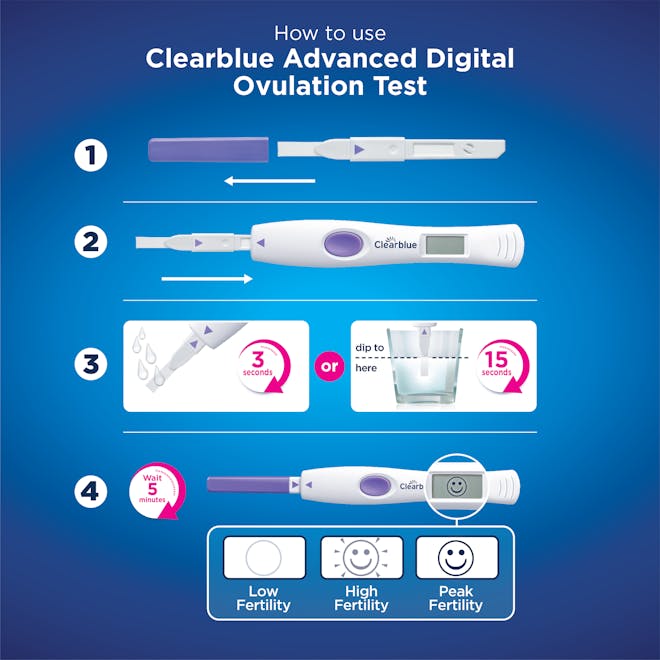6 things you only know if you’re tracking your ovulation
Advertisement Promotion with Clearblue

From knowing when you’re most fertile to understanding your menstrual cycle, there are loads of benefits to tracking your ovulation
But if you don’t fancy marking dates on the calendar or taking your temperature every day, there is an easier way …
The Clearblue® Advanced Digital Ovulation Test is easy to use, means no more guesswork and can actually DOUBLE your chances of getting pregnant*.
*In first cycle of use vs not using ovulation tests
FREE NEWBORN NAPPIES
What is ovulation?
Ovulation is when an egg is released from one of your ovaries, usually around 12-16 days before your next period starts.
Typically, one egg is released each month as part of your normal menstrual cycle and will survive for 24 hours after you ovulate. If in that time a sperm meets and fertilises the egg, you’ll conceive.
What are the signs I’m ovulating?
If you're already tracking your ovulation, here are 6 physical and emotional changes you might already have spotted:
1. You become an expert in cervical mucus
This is probably not something you’d ever thought you’d say out loud! Tracking your ovulation means you might start to see a pattern in your discharge. Just before you ovulate, your mucus might become thinner and stretchy – a bit like raw egg white. This is totally normal and is designed to help sperm move through your cervix when you ovulate.
2. You’re prepared for mood swings
We all have days when we suddenly feel irritable or teary for no apparent reason. But when you’re tracking your ovulation, you’ll quickly realise why these mood swings are happening. And – you’ve guessed it – they’re often caused by hormones!
Changes in estrogen, luteinizing hormone (LH) and progesterone can all cause these mood swings. And while you’ll probably be accustomed to feeling emotional around the time of your period, it’s normal to experience this when you ovulate too.

3. You can pinpoint your fertile days
If you’re trying to get pregnant, having sex around the time you ovulate can boost your chances of success. So knowing when you’re most fertile is key.
The Clearblue Advanced Digital Ovulation Test typically identifies 4 or more fertile days^ in your cycle. It does this by tracking the 2 key fertility hormones we mentioned above: estrogen and luteinising hormone (LH).
When you’re at your high fertility days, a flashing smiley face will appear on the test. And when you're on your peak fertility days, you will see a static smiley face so you know it’s go, go, go!
^In a study of 87 women, 4 or more fertile days were identified in 80% of cycles using actual cycle length.
4. You understand your body better
So many physical changes happen in your body every month, you probably don’t notice a pattern to them.
By understanding your cycle, you might recognise your skin breakouts, mild cramping and tender boobs are actually all ovulation or PMS symptoms.
It can be useful to keep a diary of what symptoms you have and when. That way you can spot if there is anything out of the ordinary for your body.
5. You know why you have a higher libido
An increased sex drive is common around the time of ovulation. Using the Clearblue Advanced Digital Ovulation Test means you can plan ahead and have more opportunities to get pregnant.
6. You can spot any potential fertility issues
Tracking your ovulation can also help you spot any patterns, including an irregular cycle. This could be caused by a number of things including polycystic ovary syndrome or hormonal imbalances.
Speak to your GP if you’re concerned about your menstrual cycle or your fertility.
Please note: Clearblue Advanced Digital Ovulation Test is not intended for contraceptive use or if you do not have menstrual cycles. It is not suitable if you have recently been pregnant, reached the menopause, have polycystic ovarian syndrome (PCOS) or are taking certain fertility drugs. Women with medically diagnosed fertility problems should ask their doctor if the product is suitable for them.



